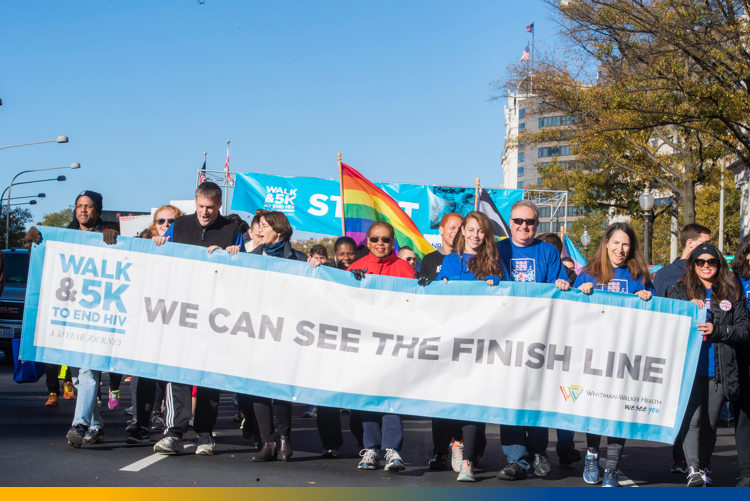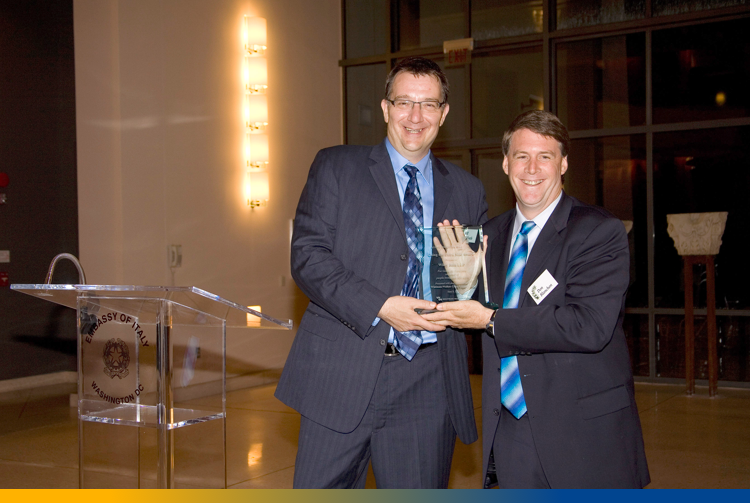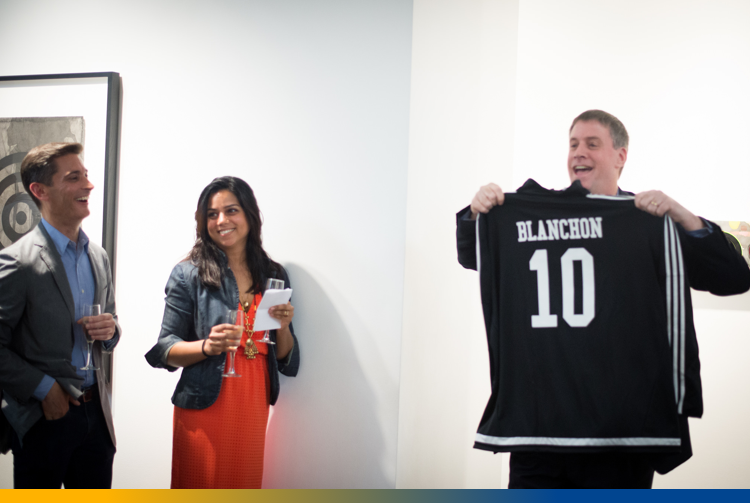As part of Whitman-Walker’s 40th anniversary, officially January 13, 2018, we’re sharing 40 stories to help tell the narrative of the Whitman-Walker community. We’d like to introduce you to Don Blanchon, Executive Director at Whitman-Walker Health. On Tuesday, May 1st of 2018, Don celebrated his 12-year anniversary as executive director. In celebration of this milestone, we wanted to share Don’s story as well as his connection to the mission of Whitman-Walker. In his time here, he’s learned that, “The single biggest asset Whitman-Walker has is the support of the LGBTQ community and their straight allies.”
In October 2017, Metro Weekly profiled Don Blanchon and featured him on the magazine’s cover. Read the full profile by John Riley here.

Stepping off at the 2016, 30th anniversary of the Walk & 5K to End HIV, formerly AIDS Walk Washington
Five Quotes from Don’s Interview:
On His First Experience with HIV/AIDS:
“My first experience goes all the way back to 1986. I was in New York City in graduate school. I was in the public health program, and some of my classmates started getting sick, and then two of my classmates passed away. Living in New York in the late ’80s was eye-opening, and it wasn’t just that I lived there and read about it. I mean, there were people in my class who were there, and then, within six months, weren’t there. People were like, ‘What is going on?’ There was so much coverage in New York, both in the gay press and otherwise. It was so scary at that time. And then by the time I got to 1990, we were dealing with my younger brother, Robert.”
On When He First Joined the Whitman-Walker team:
“When I joined, I thought the most important thing I could do is to try and bring some stability so that people knew that they could count on us. I didn’t want people worried about whether we were going to be open, because at the time we had had financial difficulties. I wanted people to know that they could come in and get tested for STDs and HIV. I didn’t want anybody worried about whether or not we could fill their medications, because if we didn’t have enough money we wouldn’t be able to stock the shelf for medications.
Things like that are really basic, but I was trying to build a sense of Whitman-Walker as a sanctuary, as a safe haven. I felt like we needed to be that place again, so I started with this premise: ‘Let’s be stable and constant for people. Regardless of how bad it is in the outside world, we’re still here.’ ”

Don at the 2009 Going the Extra Mile Legal Services reception presenting an award to law firm Wiley Rein
On What the Whitman-Walker Team Wants to Achieve:
“If I’m candid with you, we haven’t done enough yet to support east of the river and the communities and individuals that live there. There are reasons why we’ve chosen to do what we’ve done on 14th Street, but we have a lot of work left to do east of the river, and that, quite frankly, is kind our single biggest priority right now: to figure out our long-term commitment there.
I’ve used the analogy that Jim Graham and others brought us to 14th Street many years ago, when this was an area that was a really difficult, challenging neighborhood for a host of reasons. We put a flag in the ground at S Street, then we put a flag in the ground at R Street, and we were here for three decades. The neighborhood has changed significantly, but it will continue to take care of people. We need to think like that for east of the river.”
On Visiting His Brother Robert during the Epidemic
“I visited him a number of times when he was sick. I remember one time he lived in Soho in a small apartment, and I remember coming in, and it was like those old images you’ve seen in the plays or movies about the epidemic, where there are just bins of medications, and something on the refrigerator that looks like a Gantt Chart, with when he was to take everything and how. I just looked at him, like, ‘How do you remember to do this?’ I was just dumbfounded. I give him a lot of credit. He had a fighter’s spirit. He always had from the day he was born.”
On What the Whitman-Walker Team Has Achieved:
“I think the single biggest accomplishment that my team has achieved is people are looking to us with a sense of hope that this is a place they can be
really proud of, where they can be affirmed for who they are, where they can get great care.”

Don, a soccer lover, opens his 10-year anniversary gift. It’s a Whitman-Walker coach’s jacket


